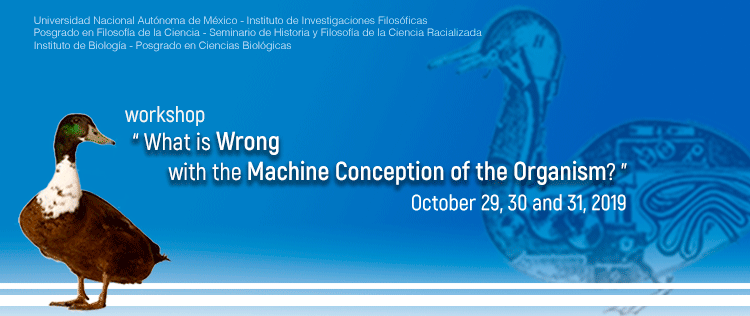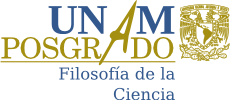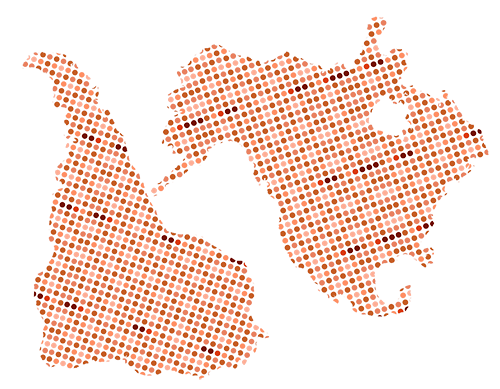What is Wrong with the Machine Conception of the Organism?

Universidad Nacional Autónoma de México - Instituto de Investigaciones Filosóficas
Posgrado en Filosofía de la Ciencia - Seminario de Historia y Filosofía de la Ciencia Racializada
Instituto de Biología - Posgrado en Ciencias Biológicas
workshop
"What is Wrong
with the Machine Conception of the Organism?"
Dr. Daniel J. Nicholson
Konrad Lorenz Institute for Evolution and Cognition Research (Klosterneuburg,
- October 29th - Aula 6, 10:00 am. - 12:00 pm.
-
October 30 and 31 - Aula Alejandro Rossi, 10:00 am. - 12:00 pm.
* Conferencias en inglés y preguntas en español
The workshop will answer the question (from an organic and procedural perspective) using three different arguments:
1. "Organisms ≠ Machines: The Argument from Teleology"
2. "Organisms ≠ Machines: The Argument from Thermodynamics"
3. "Organisms ≠ Machines: The Argument from Scale”
Despite all its successes, modern biology has done remarkably little to tackle the fundamental question that lies at its very heart, namely ‘What is the nature of the organism?’ Contemporary biologists (and philosophers of biology, for that matter) seldom ask this question openly and explicitly. The reason is simple: they already presuppose the answer. The organism is a machine. Indeed, the history of biology since the seventeenth century is in many ways the story of the success of the machine conception of the organism (MCO), formulated by René Descartes, and developed by numerous biological thinkers over subsequent centuries.
Today, the MCO is one of the most pervasive metaphors in biology. Part of its success lies in its remarkable plasticity, as it is able to take a variety of different forms depending on the context. To mention only a few of its contemporary manifestations, in developmental biology it equates the embryo with a computer that executes a predetermined set of operations in accordance with a program encoded in its genes; in evolutionary biology it assimilates organisms with optimally-designed artefacts blindly engineered by natural selection; and in molecular biology it identifies the cell as a factory of highly specialized molecular machines.
In recent years, however, there have been growing voices of dissent as more biologists and philosophers have begun to question the theoretical legitimacy of the MCO. It is becoming clear that, despite its undeniable heuristic value, the MCO offers only a partial, and rather distorted, view of living systems. The reason is that, some superficial similarities notwithstanding, organisms are fundamentally different from machines. From an ontological point of view, the MCO is fraught with problems. In this series of talks, I will advance three distinct arguments against the MCO with the purpose of establishing its inadequacy as a general theory of living systems:
The first, which can be referred to as the argument from teleology, states that organisms are intrinsically purposive (in the sense that their activities and internal operations are directed towards the maintenance of their own organization), whereas machines are extrinsically purposive (given that their workings are geared towards fulfilling the functional ends of external agents).
The second, which can be referred to as the argument from thermodynamics, states that organisms exhibit dynamic stability (due to their need to constantly exchange energy and matter with their surroundings in order to keep themselves in a negentropic steady-state far from equilibrium), whereas machines exhibit static stability (given that they do not require to constantly expend free energy to ensure their continued preservation as they slide back and forth from equilibrium to near-equilibrium conditions).
And the third, which can be referred to as the argument from scale, states that owing to their microscopic size, cells (and their macromolecular constituents) are subject to drastically different physical conditions compared to macroscopic objects like machines, and that consequently using machine metaphors to explain molecular and cellular phenomena is far more likely to obscure and deceive than it is to elucidate and enlighten.
The first of these arguments has especially salient consequences for development and evolution, the second has particularly important implications for morphology and physiology, and the third is of crucial relevance for molecular and cell biology.
Over the course of the three talks, I will propose an alternative conceptualization of living systems and explore the scope and limits of metaphors in science more generally.



.png)
.png)

Aviso de privacidad



 Circuito Maestro Mario de la Cueva s/n, Ciudad Universitaria, C.P. 04510, Coyoacán México, CDMX
Circuito Maestro Mario de la Cueva s/n, Ciudad Universitaria, C.P. 04510, Coyoacán México, CDMX